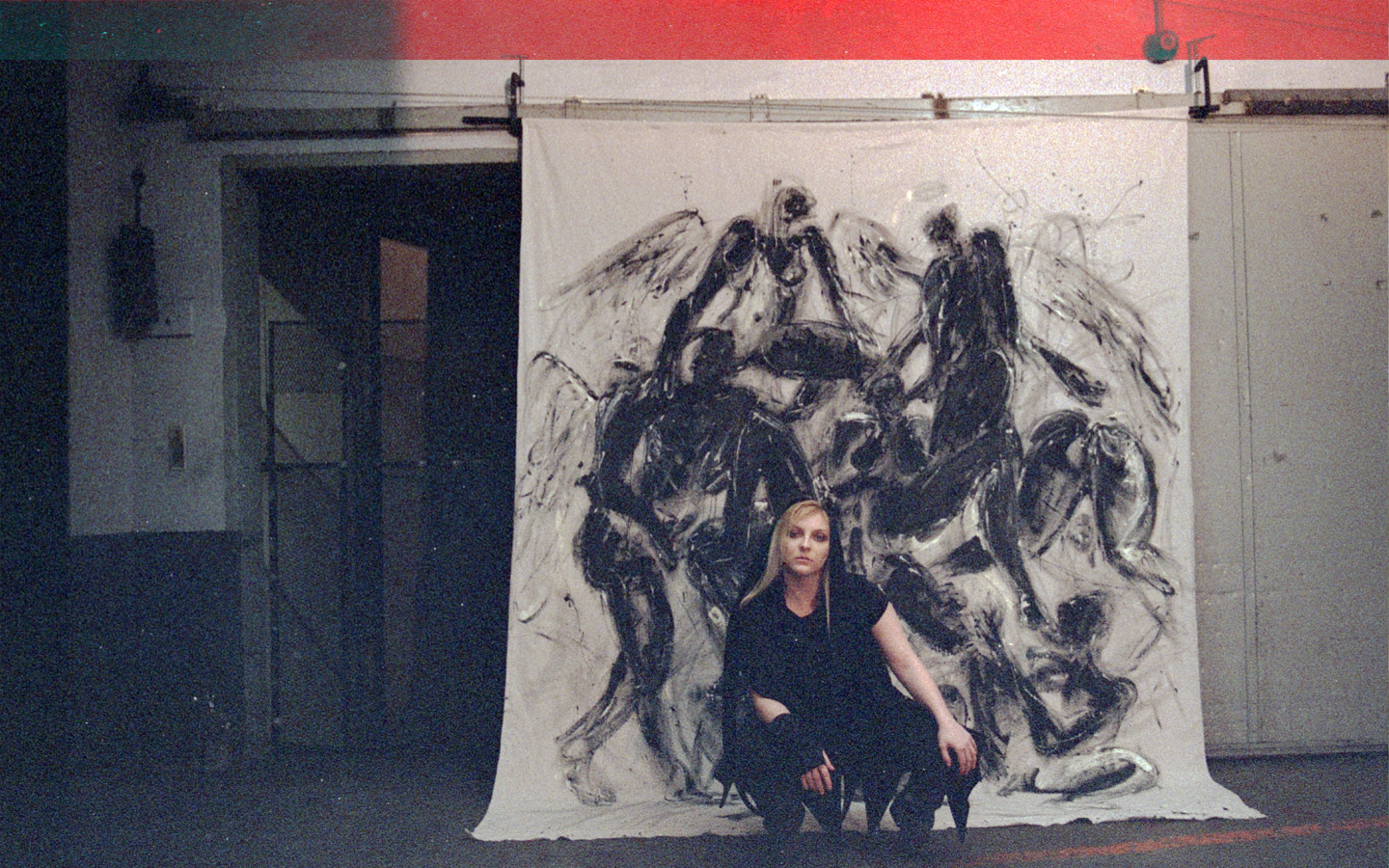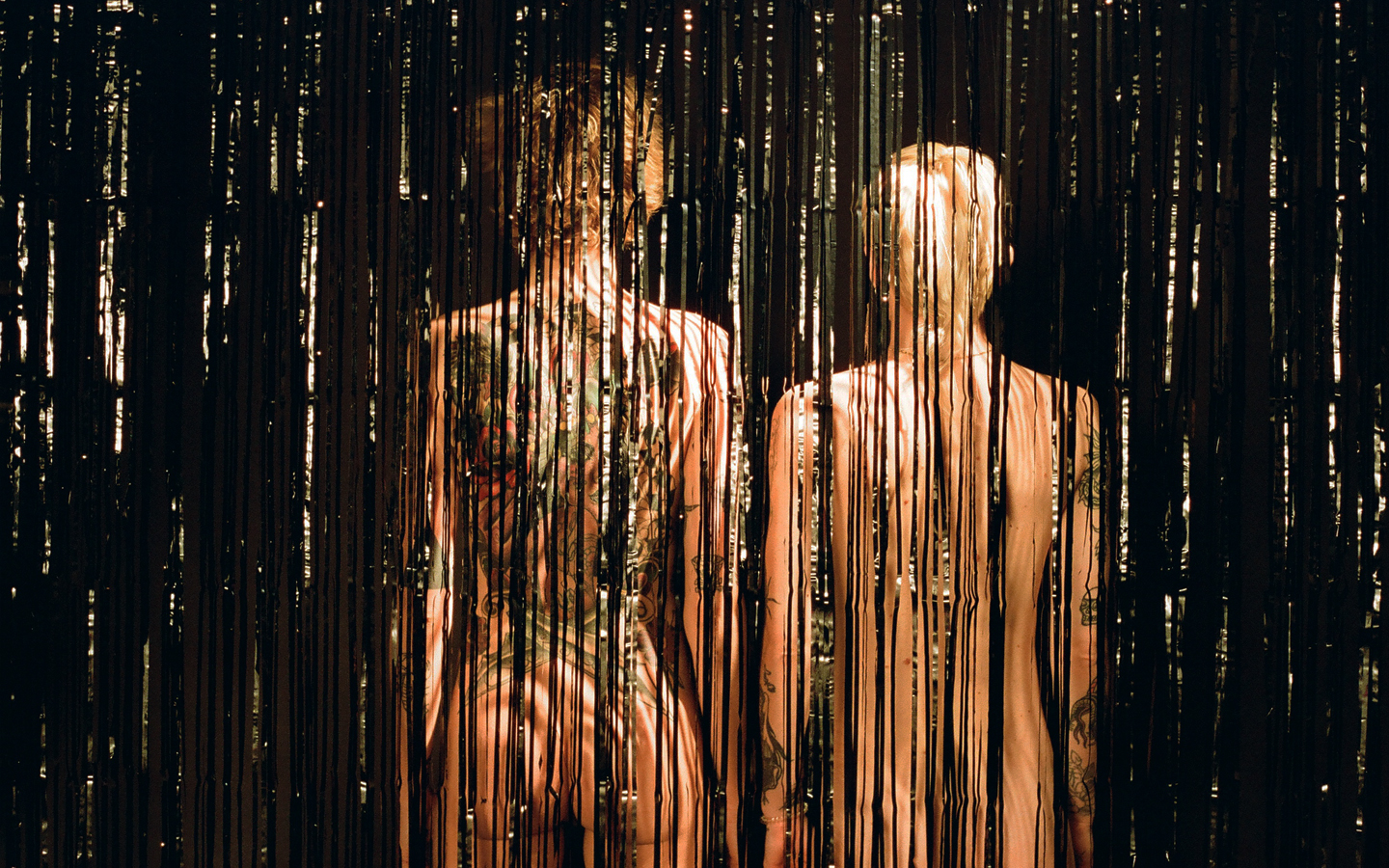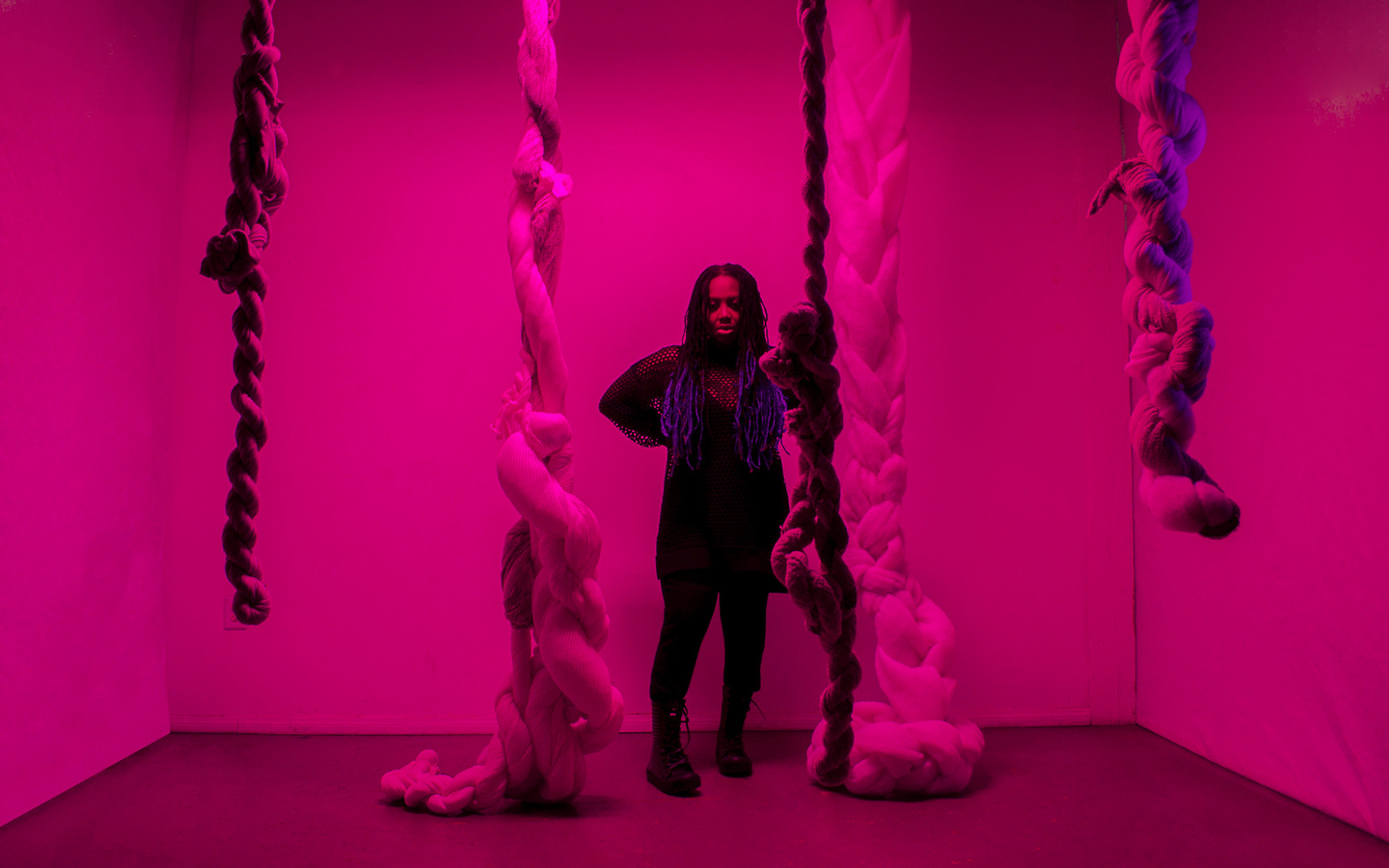
Asexuality
text KELDINE HULL
35mm film MILANA BURDETTE
9×12’ acrylic on linen DAMIAN GOMES
I want people to know that I know myself enough, more than they or anyone else knows or thinks they know, to say I am asexual. Don’t invalidate me just because you can’t understand or wrap your head around it. To people who say sex is the main thing that keeps a relationship together: you can have sex without romance, why can’t you have romance without sex?
KYLA RAYA
I lost my virginity when I was 30-years-old.
I’ll let that sink in for a moment.
For most of my adult life, I was the target of inappropriate comments that bordered on the edge of hilarity like, “Just do it already,” or, “You don’t know what you’re missing,” or (my favorite), “Don’t you get urges?” People thought I was broken, and I couldn’t even blame them because a part of me thought I was broken, too. We live in a society that revolves around sex. It sells, and everyone’s doing it. Ask the Kim Kardashians and Paris Hiltons of the world. Ask the advertisers who make an attractive woman with an ample bosom eat a burger on camera to make us crave that burger just a little bit more. Ask the club promoters who pack their venues with half-naked women to attract the men who will undoubtedly empty their pockets on overpriced drinks, just for the chance of maybe taking one of those women home. Sex sells, and it’s everywhere. It’s on our TVs, our smartphones, billboards—hell, I even saw a corner street vendor use sex to sell oranges.
In my early 20s, I enjoyed telling people I was a virgin and watching their jaws slowly drop as if they’d seen Abraham Lincoln riding in on a unicorn with ribbons in his hair. However, at a certain point, somewhere around my mid-20s, part of me just wanted to get it over with so I didn’t have to hear the comments anymore; the “sage” advice verging on ridicule from people who told me I didn’t know what a real relationship was because I’d never had sex. For a long moment in my life, I was so afraid of it that I couldn’t even desire it. Then five years ago I met my boyfriend, Greg. He was patient enough to understand that in a society so obsessed with sex, I was worth the wait.
I met Kyla Raya by chance. It was late October, and I was stressed out because I had been assigned this editorial on asexuality but was struggling to find someone asexual to talk to. Kyla Raya and my sister both dance, and my sister invited her over one afternoon. I didn’t know she identified as asexual, and why would I? It’s not something you ask someone when you first meet them. Asexual people don’t wear a sign on their forehead declaring they have no desire to have sex. Contrary to popular belief, our sexuality doesn’t need to define us.
A few days later, I asked my sister if she knew anyone asexual who felt comfortable talking about their experience. “My friend Kyla Raya,” she said. I sent some questions to Kyla, told her to feel free to be as open as she wanted, and learned more from her about asexuality than I ever could have imagined.
I had so many questions. I think the majority of us unfamiliar with asexuality might even have the same questions. I wanted to start from the beginning, when she first realized she was asexual. “I’ve always felt like something was different about me when it came to the topic of sex,” she began. “I wasn’t that interested in it, and I never felt any ‘sexual attraction’ towards anybody; I’ve never seen someone and been like, “I want to have sex with them.” I didn’t even know there was a term for what I was feeling until I got to college, when I started visiting its Pride Center. At first I thought I was Grey-Asexual, a type of asexuality on the asexual spectrum where you only feel sexual attraction sometimes and very arbitrarily. Then I realized I was just straight up asexual. Asexuality is the lack of sexual attraction; you don’t feel sexual attraction at all.”
As simple as asexuality might sound to some, there’s a complex myriad of emotions that make up the spectrum. Many asexuals identify with two orientations; romantic and sexual. Romantic orientation ranges from heteroromantic, a person who is romantically attracted to a member of the opposite sex or gender, to aromantic, a person who experiences little or no romantic attraction to others. And falling somewhere in between are homoromantics, biromantics, and panromantics. Sexual orientation within the spectrum has three main categories: asexual, gray-a and demisexual, and sexual. Between someone who doesn’t experience sexual attraction and someone who does rests the in-between and those who don’t experience sexual attraction unless they form a strong emotional connection with another person.
I wanted to know how people responded to her and what their reactions were to someone who identifies as asexual. “People’s reactions are half and half,” she explained. “Half of the people, even if they don’t completely understand it, accept it, accept me, and ask questions about it to understand it more. The other half say things like, ‘You just haven’t found the right one,’ or ‘You just haven’t had good sex,’ or ‘You haven’t even had sex, how do you know who you are?,’ or after I was no longer a virgin: ‘You had sex, you can’t be asexual,’ and ‘Everyone feels sexual attraction,’ as well as ‘A relationship isn’t real if you don’t have sex,’ and the like.”
Not long before that, I’d heard similar comments, comments that made me feel insecure and ashamed, subhuman and “subwoman.” Sexuality, in general, offers such a broad spectrum of different experiences, and somewhere within that I found commonality with someone who identifies as a different sexual orientation than I do. As different as we all are, there’s so much that unites us.
I was curious about what relationships are like for asexual people, and if I’m being honest, I was even more curious about what role intimacy plays if there’s no desire to have sex. “When I first started noticing I didn’t feel sexual attraction, I was afraid of being in a relationship because of the notion that all relationships have some sort of sexual component no matter what,” Kyla explained. “I felt like whoever I was dating, or going to date, will break up with me because of my feelings towards sex. I am currently in a relationship and am no longer a virgin, and the person I am dating is very understanding and doesn’t pressure me at all into anything sexual. They didn’t understand asexuality at first, but they accepted it and were willing to learn more about it. When I did lose my virginity to them, they asked, ‘So is it safe to say that you just found the right person?’ and I flat out said, ‘No. I’m still not sexually attracted to you. I was able to have sex with you because I trusted you and was comfortable with you on a level I’ve never had with anybody else.’ Intimacy is important in relationships, but sex isn’t the only way to be intimate with your partner. Sex is not the most important thing in my life. I enjoy it when it happens, but I can live my life without it.”
Many well-intentioned people had a lot of misplaced and preconceived ideas about why I was still a virgin after 30 years. Most people thought I had experienced some form of molestation, which I can fortunately say never happened. Others thought I was standoffish, cold, and incapable of loving someone in an intimate way. I could only imagine what people thought about Kyla. “One misconception that people thought is if you have sex, or have ever had sex, you are not asexual,” she explained. “Asexuality is the lack of sexual attraction. You can still do sexual actions for the feeling of it or the sensuality of it. Another misconception is people think that if I identify as asexual, or don’t feel sexual attraction, that something traumatic must have happened. Even if something did or didn’t happen, my past doesn’t matter, and I don’t need to justify myself to them.” In fact, no one needs to justify anything about themselves to anyone—whether it’s their sexual orientation or anything else in life that we’ve all faced scrutiny for. Kyla understood something that took me decades to figure out: it’s okay to be different and we owe zero explanations for it. ҂




